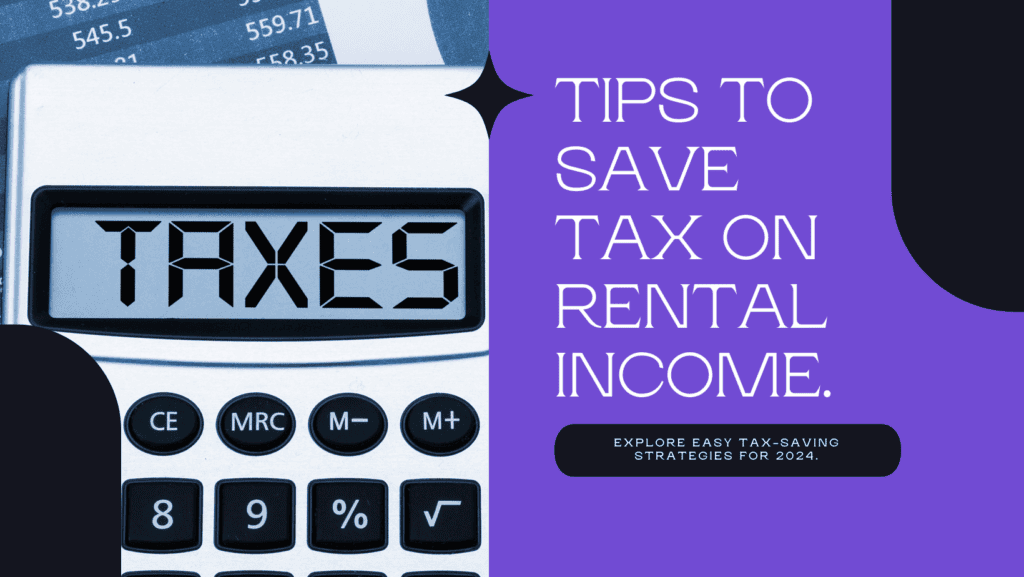
How to save tax on rental income: Intro-
Saving tax on rental income can feel like navigating a maze, but it’s essential for maximizing your earnings as a property owner. In 2024, understanding how to save tax on rental income will be more important than ever, given the changing landscape of tax laws and regulations. This guide will walk you through simple yet effective strategies to help you keep more of your rental income in your pocket.
Understanding Rental Income Taxation
# What is Rental Income?
Rental income includes all the income you receive from renting out your property. This could be a single-family home, an apartment, or even a part of your own residence. It’s essential to understand that rental income doesn’t just include rent payments. It can also encompass advance rent, security deposits used as rent, and expenses paid by the tenant.
# How Rental Income is Taxed ?
Rental income is generally taxed as ordinary income, which means it will be added to your total income for the year and taxed at your marginal tax rate. However, there are numerous ways to reduce the amount of rental income that is subject to tax, which we’ll explore in this article.
Essential Tips to Save Tax on Rental Income
# Claiming Depreciation
What is Depreciation?
Depreciation is a tax deduction that allows you to recover the cost of your rental property over time. The IRS assumes that your property will lose value due to wear and tear, so it allows you to deduct a portion of the property’s cost each year.
How to Claim Depreciation on Rental Property
To claim depreciation, you’ll need to determine the basis of your property, which is generally the purchase price plus any improvement costs, minus the land value. Then, using the Modified Accelerated Cost Recovery System (MACRS), you can calculate the annual depreciation deduction. This can significantly reduce your taxable rental income.
# Utilizing Deductions
Common Deductible Expenses
Several expenses related to your rental property are deductible. These include mortgage interest, property taxes, operating expenses, depreciation, and repairs. Each of these deductions can help lower your taxable rental income.
Record-Keeping for Deductions
To maximize your deductions, it’s crucial to keep accurate records. Save all receipts, invoices, and bank statements related to your rental property. Consider using accounting software tailored for landlords to keep everything organized and easily accessible during tax time.
# Understanding Allowable Expenses
Repairs vs. Improvements
It’s important to differentiate between repairs and improvements, as they are treated differently for tax purposes. Repairs are immediate fixes like fixing a leaky faucet or patching a hole, and they are fully deductible in the year they occur. Improvements, such as adding a new roof or remodeling a kitchen, must be depreciated over time.
Operational Costs
Operational costs, such as advertising for tenants, legal fees, and management fees, are also deductible. These everyday expenses are necessary for the running of your rental property and can help reduce your overall taxable income.
# Taking Advantage of Mortgage Interest
How Mortgage Interest Deduction Works
If you have a mortgage on your rental property, the interest you pay on that mortgage is deductible. This can be one of the largest deductions available to landlords, significantly lowering your taxable income.
Calculating Your Deduction
To calculate your mortgage interest deduction, you’ll need to refer to the Form 1098 provided by your lender. This form will detail the total interest paid during the year, which you can then deduct on your tax return.
# Leveraging the 1031 Exchange
What is a 1031 Exchange?
A 1031 exchange, named after Section 1031 of the Internal Revenue Code, allows you to defer paying capital gains tax when you sell a rental property, as long as you reinvest the proceeds into a similar property.
Benefits and Process
The main benefit of a 1031 exchange is the ability to defer taxes, which can provide more capital to invest in new properties. To execute a 1031 exchange, you’ll need to follow specific rules and timelines, so consulting with a tax professional is advisable.
Advanced Strategies to Save Tax on Rental Income
# Forming a Real Estate LLC
Benefits of an LLC for Rental Properties
Forming a Limited Liability Company (LLC) for your rental properties can provide legal protection and potentially more favorable tax treatment. An LLC separates your personal assets from your business assets, reducing personal liability.
Tax Advantages
LLCs can offer tax advantages, such as the ability to choose how you want to be taxed (sole proprietorship, partnership, S corporation, or C corporation). This flexibility allows you to optimize your tax strategy based on your specific circumstances.
# Renting to Family Members
Rules and Regulations
Renting to family members can offer tax advantages, but it’s crucial to follow IRS rules to avoid complications. The rent charged should be at market rate, and all transactions must be documented like any other rental agreement.
Ensuring Compliance
To ensure compliance, treat the rental to a family member as a business transaction. Use a formal lease agreement, keep detailed records, and report all rental income and expenses accurately.
# Using Passive Activity Loss Rules
Understanding Passive Activity Losses
Passive activity losses occur when your rental expenses exceed your rental income. These losses can often be used to offset other passive income, potentially reducing your overall tax burden.
How to Offset Rental Income
To utilize passive activity losses, you must actively participate in the management of your rental property. There are specific IRS rules and thresholds to qualify, so it’s important to understand these requirements fully.
# Taking Advantage of Tax Credits
Energy Efficiency Credits
Investing in energy-efficient upgrades can qualify you for tax credits. These credits directly reduce the amount of tax you owe, offering significant savings.
Rehabilitation Credits
If you own a historic building or are involved in certain types of property rehabilitation, you might qualify for specific tax credits. These can offset the costs of significant improvements and provide a substantial tax benefit.
Practical Steps to Implement Tax Saving Strategies
# Maintaining Accurate Records
Importance of Documentation
Good record-keeping is essential for maximizing your tax savings. Accurate documentation supports your deductions and can protect you in the event of an IRS audit.
Tools and Methods
Consider using digital tools like accounting software or mobile apps designed for landlords. These tools can streamline record-keeping and ensure that you don’t miss any potential deductions.
# Consulting with a Tax Professional
When to Seek Professional Help
Complex tax situations or significant changes in your rental income strategy may warrant consulting with a tax professional. Their expertise can help you navigate the nuances of tax law and ensure you’re taking full advantage of available deductions and credits.
Choosing the Right Tax Advisor
Look for a tax advisor with experience in real estate. They will be familiar with the specific challenges and opportunities related to rental income and can provide tailored advice to optimize your tax strategy.
# Staying Updated on Tax Laws
Monitoring Changes in Tax Regulations
Tax laws change frequently, and staying informed is crucial for effective tax planning. Regularly review updates from the IRS and other trusted sources to ensure compliance and maximize your tax benefits.
Resources for Staying Informed
Utilize resources such as IRS publications, real estate investment blogs, and professional tax organizations. These can provide valuable insights and updates on changes in tax laws affecting rental income.
Read More…
Early Retirement Plan: Tips for Financial Freedom Before 60 – See Post
Best SBI SIP for 2024: Maximize Your Investment Returns- See Post
10 Essential Steps to Create a Successful Fin-Plan for Your Future – See Post
ICICI Prudential Nifty 50 Index Fund: A Comprehensive Guide – See Post
Conclusion
Saving tax on rental income involves a combination of understanding the tax code, leveraging deductions and credits, and employing strategic planning. By staying informed and proactive, you can significantly reduce your tax burden and increase the profitability of your rental properties.
FAQs
How can I maximize my rental property deductions?
Maximize your deductions by keeping detailed records of all expenses, understanding which expenses are deductible, and consulting with a tax professional to ensure you’re not missing any potential deductions.
2. What are the best ways to document rental expenses?
Use accounting software tailored for landlords, keep all receipts and invoices, and maintain a separate bank account for rental income and expenses to simplify record-keeping.
3. Can I claim a loss on my rental property?
Yes, if your rental expenses exceed your rental income, you may be able to claim a loss. These losses can potentially offset other income, depending on your tax situation.
4. What are the risks of not reporting rental income?
Failing to report rental income can result in penalties, interest on unpaid taxes, and potential legal issues. It’s essential to report all rental income accurately to avoid these risks.
5. How often should I review my tax strategy for rental income?
Review your tax strategy annually or whenever there are significant changes in your rental income or expenses. Regular reviews can help you stay compliant and take full advantage of any new tax-saving opportunities.



